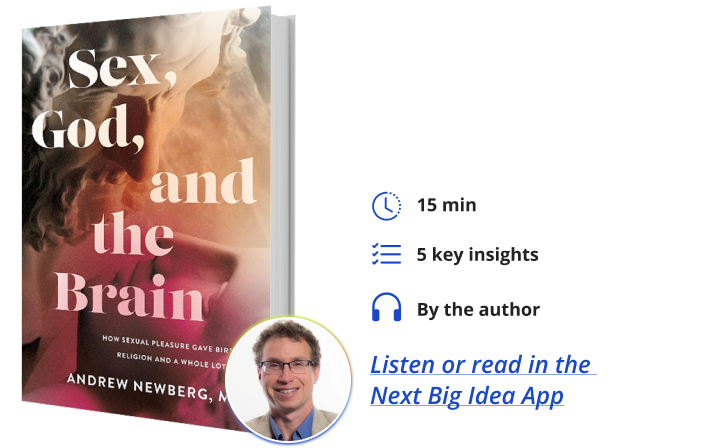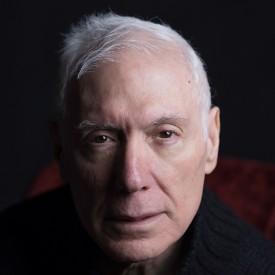Dr. Andrew Newberg is a medical doctor and a neuroscience researcher who has spent the past 30 years exploring the relationship between our brain and our religious and spiritual selves—also known as the field of neurotheology. He is director of research at the Marcus Institute of Integrative Health and a physician at Jefferson University Hospital. His work has been featured in a number of major media outlets, including Newsweek, Time, National Geographic, Discover, New York Times, Los Angeles Times, London Observer, Forbes, Washington Post, Philadelphia Inquirer, and Reader’s Digest.
Below, Andrew shares five key insights from his new book, Sex, God, and the Brain: How Sexual Pleasure Gave Birth to Religion and a Whole Lot More. Listen to the audio version—read by Andrew himself—in the Next Big Idea App.

1. Why do we think spirituality and sexuality are linked in the first place?
I want to start by answering this question from the religious perspective. In the Bible, think about what happens when humanity is first created by God. It says in the book of Genesis that as soon as man is created by God, God blesses human beings and says, “be fruitful and multiply” before adding, “believe in me.” Before God says to engage in religion, God tells human beings to procreate. We do that through sexuality. It is a creative process.
In fact, if you go back to the very first line in the Bible, what does God do before anything else? God creates the heaven and the earth. God is the creative force, in the context of religion, that creates everything around us. Whether you believe in God or not, the concept of creation and the ability to create lies at the heart of virtually every spiritual tradition.
2. Why do we think spirituality and sexuality are linked, from a biological perspective?
When you walk into a church, a mosque, or a synagogue, or begin to meditate, many different parts of the brain become involved. For anyone who does have a spiritual life, I think they would understand that because when you realize the richness and diversity of all the different kinds of spiritual practices, rituals, and experiences, it makes sense that it must engage many different parts of the brain.
For example, if you’re thinking about God or the nature of the universe, you might use the cognitive parts of your brain. If you’re feeling a sense of awe or love, you might use the emotional centers of your brain. If you see an image or feel something profound going on inside your body, these are the sensory areas of your brain. All of these can become involved when engaging in these kinds of practices and experiences. One of the most interesting changes we have observed over the years is a change in the autonomic nervous system. The autonomic nervous system is what basically connects our brain to our body, allowing us to experience feelings of arousal and energy or of calmness and blissfulness. When people engage in religious and spiritual practices, they can have either of those kinds of experiences.
“God is the creative force, in the context of religion, that creates everything around us.”
Sometimes a meditation practice can make you feel deeply blissful, and sometimes a very energetic spiritual practice can make you feel aroused, alert, and excited. What’s particularly fascinating about the autonomic nervous system is that while it has this arousal and quiescent mechanism to itself, it also happens to be highly active when we are engaged in sexual activity. In fact, both the arousal and the calming parts of the autonomic nervous system are necessary for us to have sex at all and to have a feeling of orgasm and ecstasy. Looking at all of these changes, we can see how powerful it is that sexuality and spirituality are deeply linked in the brain.
3. How did this connection between sexuality and spirituality arise?
To some degree, this goes back to my relationship with a mentor that I met when I was in medical school. He used to have these incredible dinner parties where I, as a very young and bright-eyed student, would sit around a table with luminaries of the medical world. Many of them had won Nobel prizes or developed entire new areas of research in the world of psychology or brain physiology. What we frequently talked about were religious and spiritual practices and particularly various rituals. In fact, all the dinner parties that I participated in were loaded with rituals because my mentor understood the value that rituals have in our lives.
If you think about your own life, you have many rituals. That can include religious and spiritual rituals, cooking rituals, morning rituals, and job rituals. These are different practices that we do in a rhythmic kind of way to keep us grounded and feel connected to ourselves and to whatever it is that we feel connected to. But where do rituals come from? Well, if the rituals are part of the human brain, then perhaps they evolved in our brain through animal rituals. In fact, my late colleague was not only a psychiatrist by training but also had a PhD in anthropology. He was always looking at the evolutionary perspective when it came to our understanding of the brain and our spiritual selves. He postulated that human rituals may have evolved from animal rituals, but there’s a catch: basically, all animal rituals are mating rituals.
So, the connection between sexuality and the rituals that we have as human beings, including the spiritual rituals, seem to be deeply based on millions of years of evolution. The animal mating rituals connect us to ourselves and, most importantly, to another so that we can have a very profound experience that leads to the procreation of the next generation of our species. To some degree, this is exactly what happens when we engage in a religious or spiritual ritual. We connect with others and feel a sense of ecstasy, and it leads to the next generation of people who believe in the tradition we are following.
4. How can we find neuroscientific evidence for this relationship between sexuality and spirituality?
I have studied practices in Buddhism, Hinduism, Judaism, Christianity, and Islam. I have even studied practices such as speaking in tongues and Brazilian mediums entering trance states as they connect to deceased spirits. However, none of these studies help us understand the relationship between sexuality and spirituality. This had to wait until my most recent study, which looked at a unique and unusual practice called orgasmic meditation.
Orgasmic meditation is unique and unusual because it is a paired practice. There are two individuals involved, and the focus of the practice is sexual stimulation. In our study, men stimulated the clitoris of a female participant. But interestingly, both individuals are considered to be taking part in this practice. Both of them are focusing on this form of sexual stimulation.
“For the people engaged in this practice, it was far more a spiritual practice than a sexual one.”
Now, you might be thinking that this does sound like a weird kind of practice, but if you think about other meditation practices, many are focused on physiological processes. Many meditation practices focus on the breath. They might focus on walking and paying attention to what happens when you’re walking. Or you might repeat a mantra. There are many physiological processes that can become the focus of meditation. In this case, we are talking about sexual processes.
When we looked at the brain scans of people engaged in this practice, we found some fascinating changes in both the men giving the stimulation and the women receiving it. Areas of the brain involved in sensory processing and sexual arousal seemed involved in the process. But far more importantly, we saw all kinds of changes in the higher areas of the brain that are involved in sense of self, sense of connection to others, social interaction, and profound feelings of awe.
For the people engaged in this practice, it was far more a spiritual practice than a sexual one. There are many individuals throughout many different cultures who use the energy from sexual stimulation to induce spiritual experiences.
5. What is neurotheology?
Neurotheology is the field of study that helps us understand the relationship between our brain and our spiritual selves. There are a couple of important points about neurotheology. One is that it is not just a neuroscientific evaluation of spirituality, nor is it a kind of theological or spiritual perspective on science. It looks at both the neuro and theology sides to help us understand who we are as human beings. When it comes to studying the relationship between sexuality and spirituality, neurotheology can take us back hundreds of thousands of years to some of the first figurines and images of anything spiritual.
Sexuality and spirituality have been deeply embedded together since the beginning. Perhaps that shouldn’t surprise us because sexuality and spirituality are possibly two of the most important aspects of human life and behavior that have ever existed. But neurotheology also asks us to look beyond our evolutionary background.
What does all this mean from the perspective of who we are as human beings: our psychology, our morality, and ultimately our biology in sex? How do we look at this relationship between sexuality and spirituality when it comes to moral development, spiritual development, and when things go awry? After all, both sexuality and spirituality, while they can be wonderful, can also go in very bad directions leading to things such as abuse, rape, and violence. The only way we are ever going to be able to understand both the positive and negative consequences of sexuality and spirituality is by studying how they are deeply connected to each other and to our brains and biology.
To listen to the audio version read by author Andrew Newberg, download the Next Big Idea App today:
































